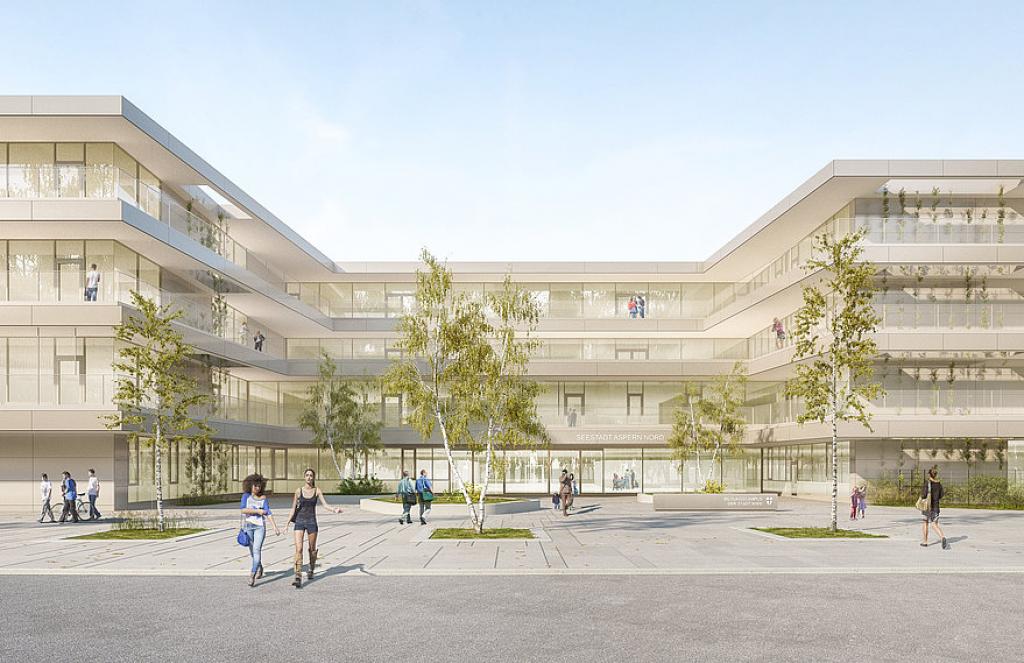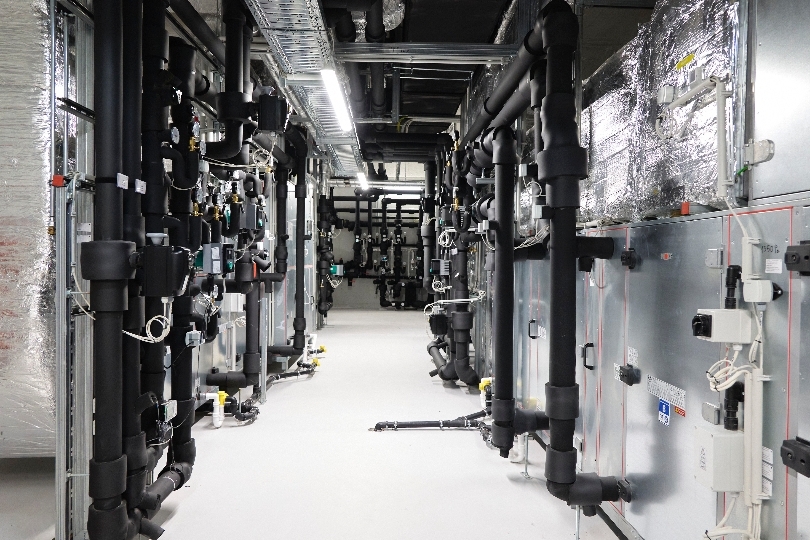Thessaloniki gets ready for its metro launch in November
The underground rapid transit lines have been under construction for almost two decades due to various project delays
 TheMayor.EU logo
TheMayor.EU logo 
The campus houses a kindergarten, elementary school, middle school and special educational facilities , Source: Bildungscampus © Karl und Bremhorst Architekten/ City of Vienna
Renewable energy will be produced on-site and it will power the entire facility
Vienna is opening a new educational campus called Lieselotte Nahsen-Schmidt in Seestadt. Said campus will have a comprehensive renewable electrical and heating system, making it a showcase project for the whole sector of educational architecture in the carbon-neutral future of Europe.
On 22 July, Vice Mayor Christoph Wiederkehr, City Councilor for Climate Change Jürgen Czernohorszky and municipal councillors Nicole Berger-Krotsch and Stefan Gara presented the heart of the project - concrete core activation and geothermal heat and cooling system.
The education campus in Seestadt is now complete. It houses a kindergarten, elementary school, new middle school and special education facilities. The building can serve up to 1,100 children and young people starting from the fall of 2021.
Thanks to innovative conceptual design, renewable sources of energy will cover the entire consumption of the campus. The core components of the energy concept include a passive house building envelope, the concrete core activation (of the false ceilings), heat pumps, geothermal probes/geothermal storage, solar power and ventilation with highly efficient heat recovery.
One of the more interesting concepts at play in the building’s climate system is concrete core activation. This is when warm/cool air is passed through holes within concrete slabs to heat them up directly before the air reaches the rooms. The heat will be dispersed in the buildings through the heat pump, which is fed with solar energy from the building roof.
 A peak on the inside of the building, Source: City of Vienna
A peak on the inside of the building, Source: City of Vienna
The ground underneath the campus will serve as an energy source for heating in the winter while in the summer, it will take advantage of the concrete core activation, to dissipate the heat into the ground. This is a highly efficient and carbon-free cooling system, where the concrete’s high mass is turned into a heat store.
Meanwhile, thanks to the insulated and airtight shell, the building can keep its temperature constant, even if there is no renewable source of energy for several days (e.g., solar during winter). This high energy retention rate helps the building compensate for its volatile and unreliable power source. At the same time, it will consume very little amounts of energy.
Vice Mayor Christoph Wiederkehr was quoted in a press release, saying: “We want to make Vienna the most climate-friendly city in Europe, and that is where projects like this play a very important role.
With ideas and drive, it is possible to achieve this very important goal and also to raise the education we offer to a new level.”
City Councillor for Climate Change Jürgen Czernohorszky added: “The Lieselotte Hansen-Schmidt education campus is an outstanding example of how climate protection and climate adaptation go hand in hand with innovative concepts.
Clean electricity and clean heat and cold protect the climate and ensure a pleasant room temperature for the children and the teachers. Clever energy solutions like here in Seestadt show that we have long had the knowledge and the means to drive the energy transition.”
If you want to keep up with how European cities and regions are changing, follow us on Facebook, Twitter and Instagram.

The underground rapid transit lines have been under construction for almost two decades due to various project delays

Now you can get your wine in Talence by paying directly in Bitcoin

That’s because the state has to spend money on updating the railway infrastructure rather than subsidizing the cost of the popular pass

Rethinking renewable energy sources for the urban landscape

The examples, compiled by Beyond Fossil Fuels, can inform and inspire communities and entrepreneurs that still feel trepidation at the prospect of energy transition

Now you can get your wine in Talence by paying directly in Bitcoin

The 10th European Conference on Sustainable Cities and Towns (ESCT) sets the stage for stronger cooperation between the EU, national and local level to fast track Europe's transition to climate neutrality.

At least, that’s the promise made by the mayor of Paris, Anne Hidalgo

The underground rapid transit lines have been under construction for almost two decades due to various project delays

At least, that’s the promise made by the mayor of Paris, Anne Hidalgo

Hostal de Pinós is located in the geographical centre of the autonomous region

Despite its church-y name, the district has long been known as the hangout spot for the artsy crowds

Urban dwellers across the EU are having a say in making their surroundings friendlier to people and the environment.

Forests in the EU can help green the European construction industry and bolster a continent-wide push for architectural improvements.

Apply by 10 November and do your part for the transformation of European public spaces

An interview with the Mayor of a Polish city that seeks to reinvent itself

An interview with the newly elected ICLEI President and Mayor of Malmö

A conversation with the Mayor of Lisbon about the spirit and dimensions of innovation present in the Portuguese capital














